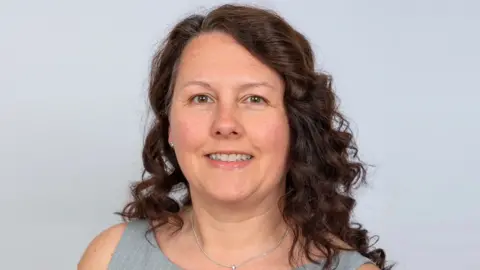'Ridiculous' waits for endometriosis diagnoses
 Janice Silvester-Hall
Janice Silvester-HallIt is "ridiculous" that some women with an agonising medical condition potentially causing infertility have been waiting more than eight years for a diagnosis, councillors have said.
Their report highlighted how some women in Staffordshire faced long waits for a diagnosis of endometriosis, and a lack of awareness of the condition.
The research by a working group addressing women’s health concluded with a number of recommendations.
Councillor Janice Silvester-Hall, who chaired the working group, said the data provided to them had indicated waits of several years and “countless” GP appointments before a diagnosis was made.
The working group had decided to focus on endometriosis, councillors said, due to the lack of profile it had.
It called for more education in schools and increased support for gynaecological conditions at council family hubs.
Endometriosis is a condition where tissue that is meant to grow only in the uterus grows elsewhere causing inflammation, bleeding and the formation of scar tissue.
The report said it was one of the most common gynaecological conditions affecting around one in 10 females of reproductive age, equating to around 1.5 million women nationally.
“It can lead to infertility, chronic pain, and reduced quality of life,” it added.
The councillor said: “There are still stigmas and taboos about what people will and will not discuss.”
She added: “One of the recommendations is that this report is shared with Keele University, as well as our district and borough councils.
“Another is to put it through onto the GPs’ training syllabus, which it isn’t at the moment – that was a recommendation that came through from a GP in particular.”
'Absolutely ridiculous'
Ann Edgeller, who was also part of the working group, said: “I didn’t realise what an effect it could have on a woman’s life and the health impact it has on them.
“Knowing that it takes eight years to get any sort of help is absolutely ridiculous.”
Another group member, Julia Jessel, felt there had been a huge shift in society.
“When I was younger it was ‘take an aspirin and get on with it',” she said.
Others said the report highlighted a significant gap in healthcare outcomes between men and women, and that it takes longer for women’s diagnoses to be recognised.
Councillor Charlotte Atkins said: “Hopefully it will mean that women are more demanding of their GPs and their health service, to ensure that women’s diagnoses are prioritised so there is some sort of equality between outcomes for men and women.”
Male members of the health and care scrutiny committee said they had found the report’s findings sobering and had not had much awareness of the issues before reading the document.
“The awareness has got to be improved,” Councillor Steven Norman said.
Councillor Richard Cox added: “There is still a lot of learning that we can all be doing.”
This news was gathered by the Local Democracy Reporting Service which covers councils and other public service organisations.
Follow BBC Stoke & Staffordshire on BBC Sounds, Facebook, X and Instagram.
